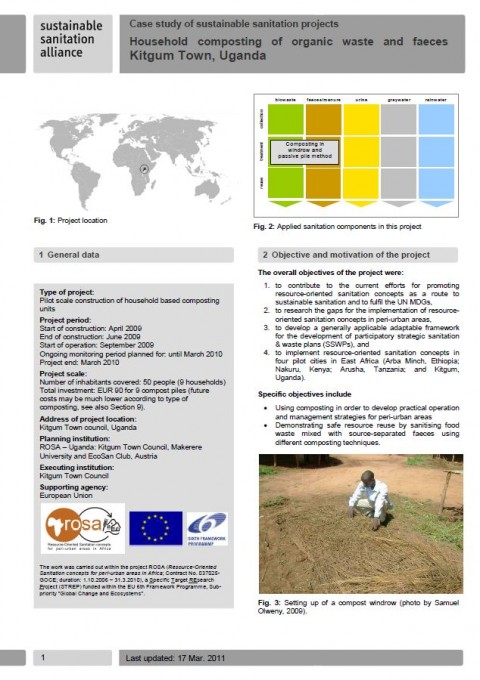Household composting of organic waste and faeces, Kitgum Town, Uganda - Case study of sustainable sanitation projects
Kinobe, J., Olweny, D., Niwagaba, C. (2010)

Published in: 2010
Publisher:
Sustainable Sanitation Alliance (SuSanA)
Author:
Kinobe, J., Olweny, D., Niwagaba, C.
Uploaded by:
SuSanA secretariat
Partner profile:
common upload
11362 Views
307 Downloads
Location of library entry
Content - Summary
This SuSanA case study compiles experiences from a ROSA sanitation pilot project in Kitgum Town in northern Uganda. The ROSA project started in October 2006. The first activity of the project was to conduct a baseline study, which was concluded by March 2007 in order to get basic information about the sanitation situation and the status of reusing nutrients from excreta, wastewater and greywater.
Nine households were identified and trained by ROSA, the Ecosan Club Austria (ESCA), and Kitgum staff (people working at the Kitgum Town Council) in February 2009 to carry out composting of solid waste and faeces. By July 2009 all targeted households had adapted the composting technique and were practicing it with minimum supervision from the ROSA staff.
A lot of sensitisation and awareness creation has been put in place concerning composting. Overall, more than 50 households were trained in hands on courses on how to make compost for their gardens. By January 2010, the total number of households performing on-site composting had grown to 100. All households who were trained on composting are doing it at their homes, producing compost for their gardens.
Bibliographic information
Kinobe, J., Olweny, D., Niwagaba, C. (2010). Household composting of organic waste and faeces, Kitgum Town, Uganda - Case study of sustainable sanitation projects. Sustainable Sanitation Alliance (SuSanA)
Filter tags
Case studies in SuSanA template Composting, vermicomposting (solid waste), composting toilets English Faeces or faecal sludge Peri-urban Sub-Saharan Africa















